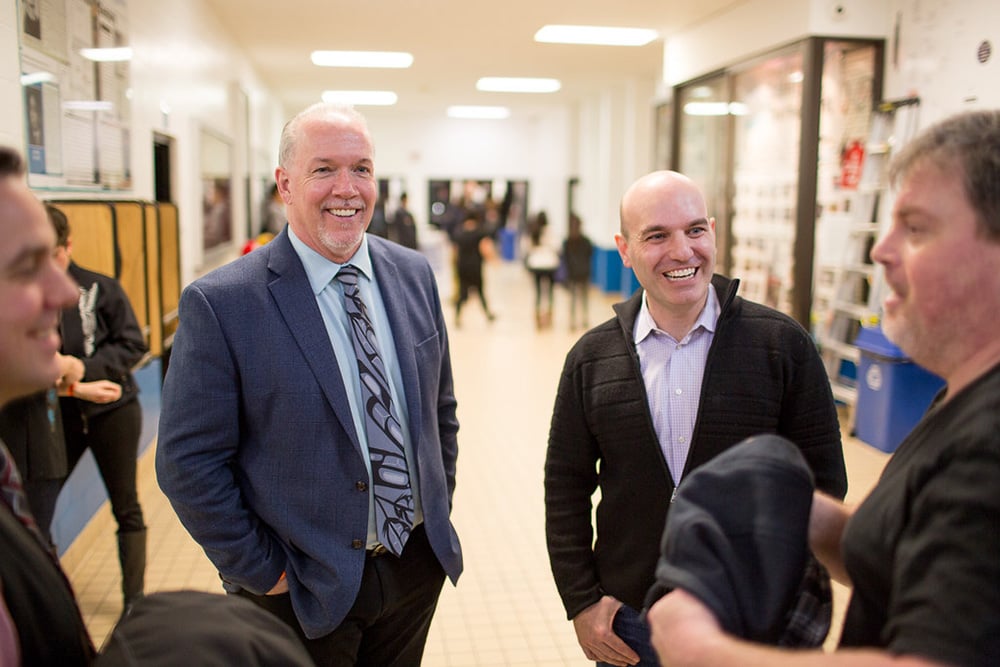“He’s not well liked.” The words, uttered about a BC Liberal candidate before an all-candidates’ debate last week, were unparliamentary at best, but especially surprising from the consistently smooth-talking Nathan Cullen, who spent 15 years representing Skeena-Bulkley Valley for the NDP in the House of Commons.
They sparked the second controversy for Cullen since he announced that he was running for the Stikine riding on Sept. 17. And the resulting public discussion has shed light on the alliances and divisions in B.C.’s northwest.
Cullen declared his intention to run two days after former Tahltan Central Government president Annita McPhee announced in a social media post that she would be seeking the NDP nomination in Stikine. Outgoing MLA Doug Donaldson had said he would not seek re-election a week earlier.
“This is a beautiful and important place and I believe it’s important to be a part of decisions that affect both me as an Indigenous woman and all the citizens of Stikine,” McPhee said in the post. McPhee previously sought the federal NDP nomination in 2019 but lost her bid to Taylor Bachrach, who replaced Cullen as Skeena-Bulkley Valley MP last fall.
Under the NDP’s equity mandate, it should have been a simple choice. The policy requires outgoing white, male MLAs to be replaced by an equity-seeking individual, such as a woman, Indigenous person or someone with disabilities. The original goal was to ensure women were nominated as NDP candidates in winnable seats.
On Sept. 21, McPhee said she learned through the media that her nomination papers had been rejected. The NDP gave several reasons — that the papers were late, that they didn’t have the required signatures — and said McPhee had made it clear following the 2019 nomination race that she no longer wanted to be associated with the party.
McPhee has denied this, calling it “hearsay.”
“I was told that two of my signatories were not BC NDP members, which is untrue. We tried to clarify this last night after they sent a late email asking if I can rectify this, which I did, and despite phone calls and emails there were no response,” she said in the Facebook post. “I feel incredibly abused in this process.”
Despite his support for the NDP, Grand Chief Stewart Phillip with the Union of BC Indian Chiefs criticized Cullen, citing a need for more women in politics: “I believe that if we had parity in leadership, the world wouldn’t be in such a mess,” he said. “Had it been me, I wouldn’t have hesitated to step aside.”
Yet the furor around Cullen’s appointment appeared to blow over quickly.
Until he was recorded disparaging North Coast Liberal candidate and Haida Nation member Roy Jones Jr. at an all-candidates forum in Smithers on Thursday.
“He’s not well liked — he’s Haida — in his own community,” Cullen said.
“The guy’s going to get bedrock 20 per cent. Like, his name is Kinkles,” he added, referring to Jones Jr.’s nickname.
The comment was made in reference to the NDP’s strength in the North Coast riding, where incumbent Jennifer Rice has won the seat twice — with roughly 57 per cent of the vote each time — since 2013.
Jones has said the name Kinkles was given to him as a child by a Japanese grocer on Haida Gwaii. It means “Golden Boy.”
Cullen quickly apologized.
“I apologize unreservedly for my comments and have done so personally to Roy. I need to, and will, do better,” he said in a tweet.
Ellis Ross, Liberal incumbent in the Skeena riding, called the comments racist. Jones is reported to have rejected the apology, saying Cullen needs to apologize to the Haida people.
The Council of the Haida Nation appeared to disagree.
On Sunday, it tweeted a statement from president Gaagwiis, whose English name is Jason Alsop, that credited Cullen with working to represent all people of the North Coast.
“Mr. Cullen has established a good relationship with the Haida Nation and his recent comments do not warrant his resignation or an apology to the Haida Nation,” he said.
On the heels of the Haida statement came another response, this time from Gitxsan territory, nearly 500 kilometres to the east. The letter, which was sent to Premier John Horgan by the Office of the Gitxsan Hereditary Chiefs, called on the party leader to remove Cullen as the NDP candidate. The letter is signed by 10 hereditary chiefs.
“The Stikine electoral district is home to one of the largest populations of First Nations people in British Columbia. It has become clear that, if elected, Nathan Cullen cannot serve or speak for these communities,” it said.
The treaty office is not only in the Stikine riding, its executive director Gordon Sebastian is Cullen’s Liberal opponent. Sebastian, who claims the hereditary name Luutkudziiwus (though this has been disputed in the feast hall), also works with several of the 10 signees.
Yvonne Lattie, Gitxsan Hereditary Chief Gwininitxw, was outraged. She and her partner, Hereditary Chief Wii’s Tiis, are two of 63 total Gitxsan hereditary chiefs. She says the office did not have the authority to make the statement.
“So many times the Gitxsan Chiefs make negative comments stating it comes from the Chiefs’ office when in reality very few Chiefs have been contacted,” she said in a Facebook post Monday. “As a Hereditary Chief, I have had a very good relationship with Nathan, we have had some very good debates on many issues.”
It’s not the first time some Gitxsan chiefs have been accused of speaking on behalf of their wilp, or house group, without authority.
Sebastian was criticized for signing an LNG agreement without consulting wilp members in 2016. A similar situation erupted with Enbridge Northern Gateway Pipelines five years earlier.
Tahltan Central Government president Chad Day is quick to assert that when he weighed in on Cullen’s candidacy over the weekend, the opinions were his own and not on behalf of the nation.
“During this year’s provincial election, I will undoubtedly be supporting Nathan Cullen of the NDP because he understands the issues of Northwest B.C.,” he said in a Facebook post before going on to address the controversy with McPhee. "I supported Annita during her MP bid for the NDP while she was living in Terrace, but I could not support her as a Stikine riding MLA candidate because she has not lived in our riding for decades.”
“We as First Nation people do not just support everyone blindly when they belong to the same racial category as we do. We want the best candidate we believe has the capacity, understanding and desire to create the changes necessary to maintain and/or improve our lives and communities.”
Day, who unseated McPhee in the 2014 Tahltan election, said he supports her generally but didn’t feel like she was the right candidate this time around.
Conversely, Tahltan band chiefs Marie Quock and Rick McLean have both supported McPhee’s provincial nomination bid.
NDP Leader John Horgan has also pardoned Cullen’s recent gaffe, saying he was “disappointed” but allowing the star candidate to stay on.
“I’m understanding in the region the people are standing behind him, the Haida Nation is standing behind him, as are other Indigenous groups throughout the territory, and I know Nathan will be working hard, hard, hard to make up for his misspeaking,” he said. ![]()
Read more: Indigenous, BC Election 2020
















Tyee Commenting Guidelines
Comments that violate guidelines risk being deleted, and violations may result in a temporary or permanent user ban. Maintain the spirit of good conversation to stay in the discussion.
*Please note The Tyee is not a forum for spreading misinformation about COVID-19, denying its existence or minimizing its risk to public health.
Do:
Do not: